TEXT AND PHOTOS BY YOKO LU
Cover photo: Olga Djaneva on SDG 6 (water and sanitation) and women and girls
The United Nations High-Level Political Forum (HLPF) this year addressed Sustainable Development Goals (SDGs) in preparation for the SDG Summit which is held in September every year. The meeting focused on SDG 6 (water and sanitation), SDG 7 (affordable and clean energy), SDG 9 (industry, innovation, and infrastructure), SDG 11 (sustainable cities and communities), and SDG 7 (partnership for the Goals).
HLPF was held from 10 to 20 July, including the ministerial segment from July 17 to 19, and the ECOSOC (Economic and Social Council) High-level Segment on 20 July. The theme was “Accelerating the recovery from the coronavirus disease (COVID-19) and the full implementation of the 2030 Agenda for Sustainable Development at all levels”. Voluntary national reviews (VNRs), which are equivalent to the National Biodiversity Strategies and Action Plans (NBSAPs) of the UN Convention on Biological Diversity and the Nationally Determined Contributions of the UN Framework Convention on Climate Change (UNFCCC), had interventions from 39 countries.
WOMEN’S MAJOR GROUP AT THE HLPF
SDG 6 (Water and sanitation)
Olga Djaneva was the lead discussant on SDG 6 (water and sanitation). She emphasized the need for proper sanitation facilities necessary for the privacy, dignity and overall health of women and girls. Rural communities were noted as water and energy resources are dependent to ensure sustained livelihoods and food security. She noted that public financing is essential for the “gender-responsive water and sanitation infrastructure [as well as] capacity building and knowledge sharing.” She also mentioned data disaggregation by gender so that progress can be tracked and gaps identified, focusing on the specific obstacles encountered by women and girls. Their needs, rights, and voices must be prioritized and reflected to ensure development justice.
SDG 7 (Affordable and clean energy)
I am honored to represent the Women’s Major Group (WMG) to the HLPF, as a speaker on SDG 7 and interlinkages. In my 3-minute intervention as a panellist alongside UNFCCC Executive Secretary Simon Stiell and Special Representative of the Secretary-General for Sustainable Energy for All and Co-Chair of UN-Energy Damilola Ogunbiyi, I highlighted the key recommendations to ensure the just, inclusive, and equitable energy transitions in support of climate action and zero emissions:
- Prioritize investment in a just transition towards low-carbon, renewable energy infrastructure and technology that is community-owned and democratically controlled.
- Delivery of climate finance pledges should be increased, and they should be grant-based, gender-transformative, and human-rights-centred.
- Recognize interlinkages between disaster risk reduction, health, and human rights.
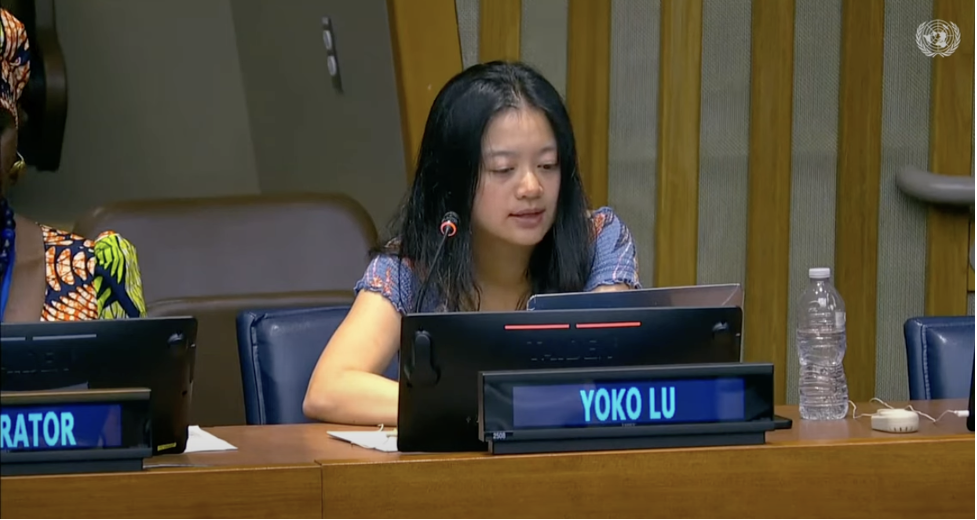
Small Island Developing States
Daniele Ramiaramanana intervened on behalf of the WMG in the Small Island Developing State (SIDS) session. SIDS is underrepresented in the decision-making processes. Food is at risk of disappearing from natural disasters and it is important to prioritize on:
- Women’s access and control over land, enabling them to know and claim their rights, and strengthening accountability and access to remedy in cases when our rights are violated.
- Efforts to implement lasting solutions to substantially reduce the risk of gender-based violence and promote resilience.
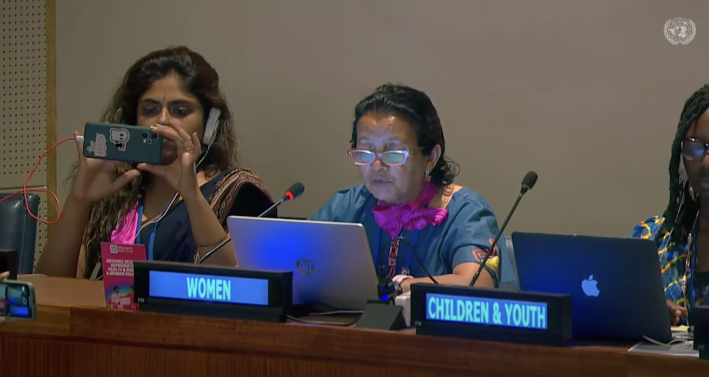
Science, technology and innovation
Atiqua Ouhajjou highlighted key messages on science, technology and innovation (STI) from multilayered approaches. She said that people of multidisciplinary educational backgrounds should have access to scientific knowledge in all categories so they can broaden their skills. The work environment in academia should be more obliged with women and gender-diverse scientists, and sexual harassment and violence should be conveyed. Considering a gender-transformative approach, Atiqua, in her speech, made the following recommendations (verbatim):
- Remove barriers to women’s, girls’ and gender-diverse people’s full participation in the digital world, ensure equitable access to new technologies and the democratization of the internet to reduce the digital divide and give women the opportunity to promote productive economic activities
- Women are not only the beneficiaries of technological progress, but they also become its protagonists, from the design stage to that of application, monitoring and evaluation. Ensure all Science, Technology and Innovation policy, leadership, and implementation groups have diverse gender representation
- Address the risks and challenges associated with the use of technology. Regulate high-risk technologies such as geoengineering to ensure human rights of impacted communities are protected. Take a human rights-based approach to the development of new technologies, such as Artificial Intelligence, and periodically assess the effects of these on the people and the planet and adapt as needed.
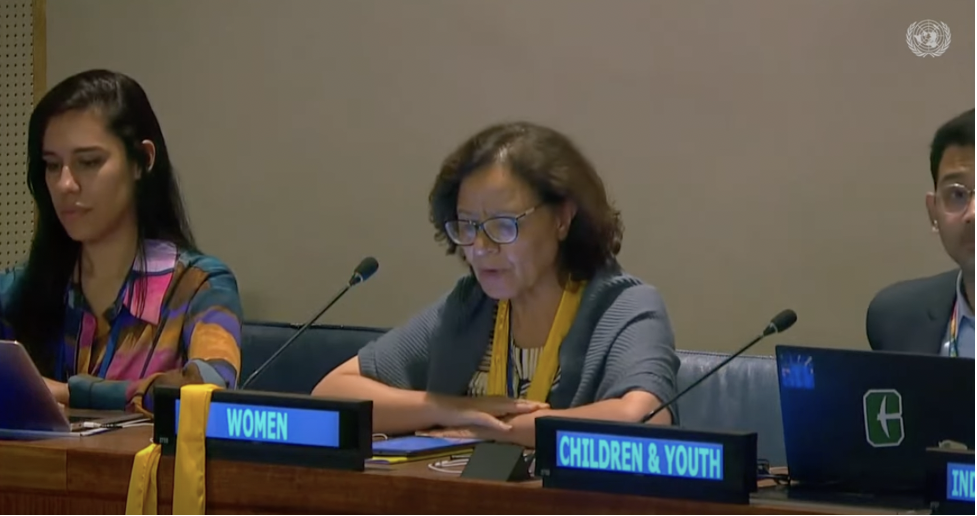
2023 HLPF KEY TAKEAWAYS
It was my first time at the HLPF, and I was very excited to attend it. However, the HLPF was a series of official SDG sessions where panellists intervene in the SDG and member states respond. There were no negotiations or declarations. Many side events occurred in parallel, thus it was impossible to follow the side events at the same time and try to make connections as most of the side events were hosted by the UN agencies. I attended bilateral meetings and exchanged contacts, which are the usual activities the conference participants engage in while the sessions are running.
Despite these rants, I am very ambitious about the upcoming SDG Summit and the UN General Assembly, as well as the Climate Ambition Summit and the New York Climate Week, all happening at the same time in September. In a private conversation, I heard that the HLPF next year will be focusing on climate. There were several side events connecting SDGs and climate, including a meeting held in preparation for the UNFCCC COP28. While it is important to connect climate to the SDGs, we must not forget that women’s rights require urgent attention. Other than the Women’s Major Group advocating for gender issues and co-hosting various side events and workshops on gender perspectives and having bilateral meetings, we need further actions to push our gender-focused voices forward so that no one is left behind – not only at the HLPF, but across all conferences.
ABOUT THE AUTHOR
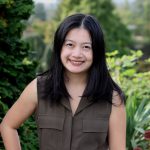
Yoko Lu is an M.Sc. Environmental Biology recent graduate who specializes in Environmental Policy. She is involved in YOUNGO, the youth constituency to the United Nations Framework Convention on Climate Change, in various initiatives, such as leading the Nature Working Group and Health Working, as the Contact Point and the Ocean Working Group as the Director of International Affairs and Policy Lead. She is currently the Contact Point of Mitigation Working Group. She also contributed to various financial mechanisms by providing recommendations to the UNFCCC processes like the New Collective Quantified Goal, Financial Infrastructure, and Multilateral Development Bank reform. She is also the Global Facilitator of the Action for Climate Empowerment Youth Forum. She co-led the YOUNGO’s COY (Conference of Youth) 16 & 17 and COP 26 & 27 Global Youth Statement, in consultation with over 35,000 youth from over 135 countries around the world.
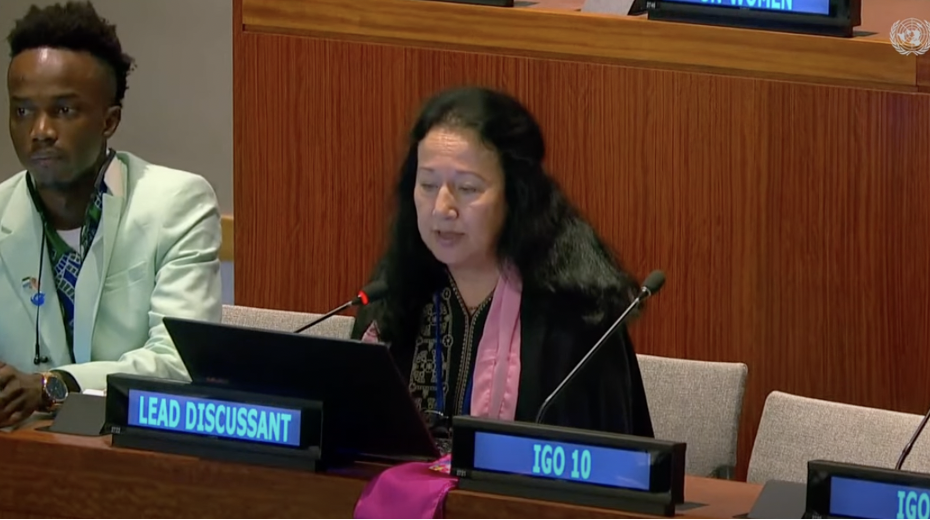

Merci Yoku lu pour la publication de ce précieux document
ATIQUA OUHAJJOU
Merci d’avoir lu notre article !